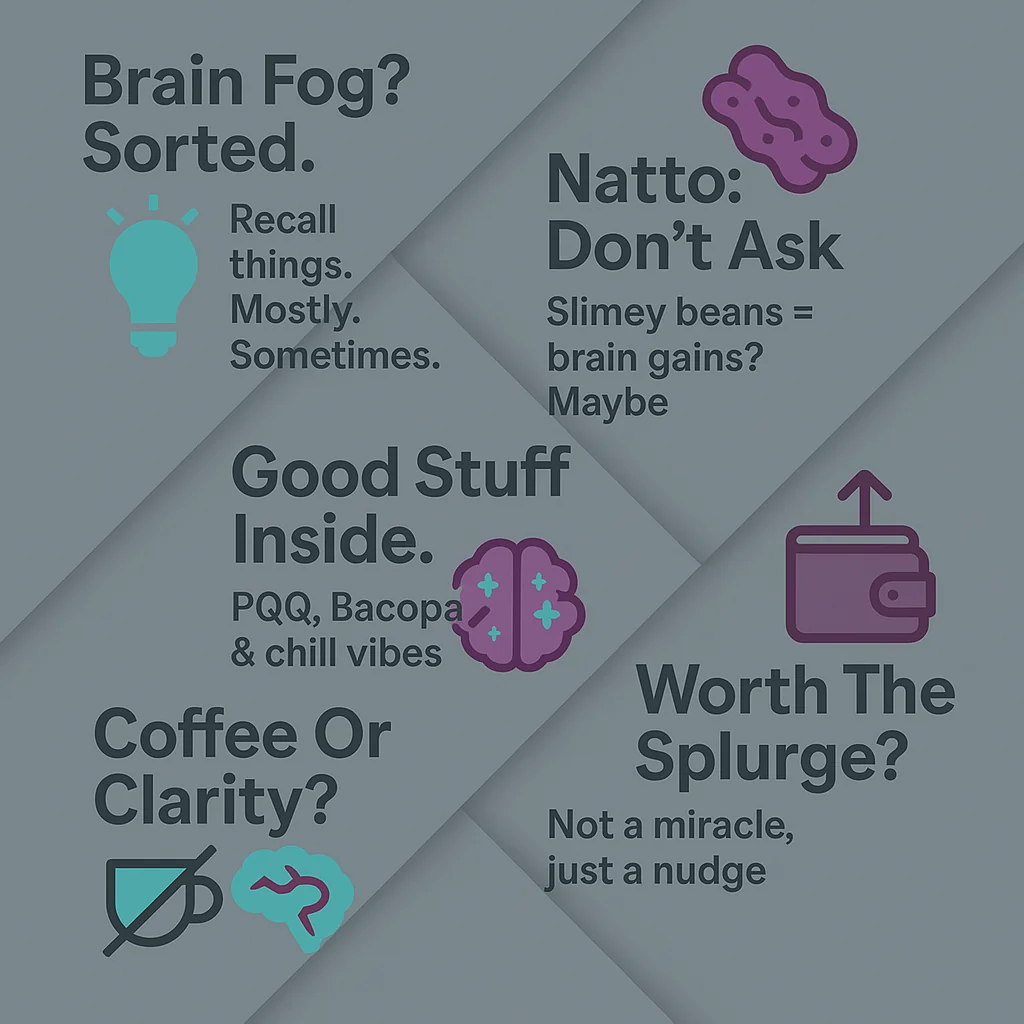Neuro-Thrive Review: Is This The Secret Sauce For A Smarter Brain?

Let’s cut to the chase: If you’ve ever caught yourself forgetting why you opened the fridge, you’re not alone. Neuro-Thrive claims to be the solution—a daily brain boost inspired by Okinawan “memory beans” and backed by Harvard research. Sounds like the kind of myth-meets-science story we’ve heard before. But with a 60-day money-back guarantee and ingredients that actually check out, it’s worth a closer look. Let’s dissect the hype.
The Hype vs. The Science: Okinawa’s “Memory Bean” Truth
First, the headline-grabbing hook: the Japanese “memory bean.” Turns out, this isn’t some alien legume—it’s natto, a fermented soybean the texture of slime and the aroma of regret. The Okinawans eat it for breakfast, and Neuro-Thrive’s creators vow it’s why their elderly folks still run marathons (or maybe just garden? Details are hazy). The real star isn’t natto itself but PQQ, a compound in it that supposedly revs up your brain’s mitochondria—the OG energy factories.
The science here isn’t complete moonshine. Mitochondrial health? Checks out. Harvard studies on PQQ? There’s a mention or two in the references. But let’s be real: You’re not eating natto anytime soon unless you’ve got a death wish (or a strong gut). Enter Neuro-Thrive, a $59.99/month veggie capsule promising the same brain gains without the gastronomic trauma.
Straight to the goodies – click!
The Ingredients You Actually Care About (And The Fluffy Bits)
Let’s cut through the pyramid of buzzwords. Real talk:
The Boys Mid-Frontal Lobe (a.k.a. The Good Stuff)
- PQQ: The MVP. Boosts mitochondria production and blood flow to the brain. A 2011 study in Food and Function even linked it to improved sleep and reduced fatigue.
- Bacopa: A.k.a. “herb memory juice” from ancient India. Boosts those neuron dendrites (the brain’s “Wi-Fi signals”). One 2016 study in Neuropsychopharmacology called it “mildly effective for memory retention.” Civilian translation: It’ll probably help with remembering your keys.
- Alpha GPC: Breaks down to choline, which ups acetylcholine—a neurotransmitter the brain uses to play 4D chess.
- GABA: The “chill pill,” literally. It’s a calming neurotransmitter that, yes, might improve focus if your brain’s a racetrack at 3 AM.
The “Sidequest” Players
- The vitamin blend (D3, B3, B6): Brain health amino-choos. Solid, but not revolutionary.
- The claims about “senior brains functioning like supercomputers”? Let’s knock that down a few pegs. Neuro-Thrive isn’t going to turn you into a trivia god—but it might stop you from losing your car in the mall parking lot.
Is It Worth Your Money? Answers Without A Marketing Filter
The Pros (AKA Why You’re Reading This):
- Science-adjacent: At least 60% of the ingredients have peer-reviewed studies backing their brain benefits.
- 60-day guarantee: Risk-free trial. If it turns out to be snake oil, you’re only out shipping costs.
- Price drop: At $59.99/month (or $49/month on bulk buys), it’s way cheaper than the $660-a-month “official” pills it name-drops.
The Cons (AKA If You’re Allergic To Spending):
- Not magic: Results depend on your baseline. If you’re young and sharp, you might not notice much.
- Lack of long-term data: PQQ is promising, but 10-year effects? Still TBD.
- Capsule logistics: Takes a month to work, so you’ll need patience (or a second bottle).
The Final Verdict: Brain Food For Thought
Here’s the deal: Neuro-Thrive isn’t going to rewrite your biology. But if you’re in your 40s or older and have a habit of losing your glasses despite being wearing them, this might be the kickstart your hippocampus needs. The formula ticks enough science boxes to justify the price, and the 60-day guarantee means you don’t have to gamble your rent money.
Is it worth $60/month? If you’d normally spend that on takeout coffees you forget to pick up, sure. But if you’re looking for a miracle, consult a neurosurgeon—not Google Ads.
Full disclosure: As an affiliate, I earn from qualifying purchases. That said, I only recommend products I genuinely believe could provide value based on my research.
